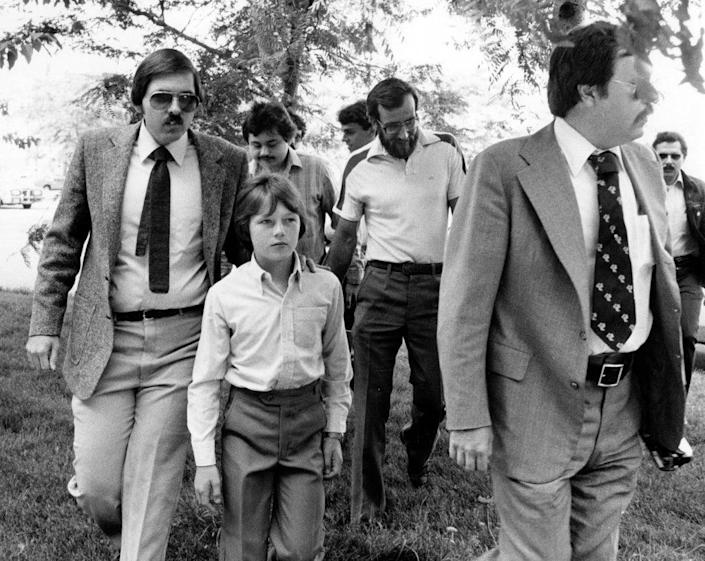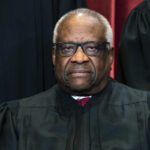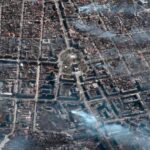
Walter Polovchak sees his 12-year-old self in the faces of the children fleeing from Vladimir Putin’s brutal attacks.
The new world that Mr Putin is now trying to force on the Ukrainian people is the very same world that he escaped when he left Soviet-controlled Ukraine and fought for his freedom to stay in America more than four decades ago.
“To me it is like reliving my plight to live in the US and to be free, as this is the same stuff that I was leaving – the manipulation, the corruption, the government control,” he tells The Independent.
“I see the horror and fear in the eyes of children, the people running for their lives.
“I watch this and it brings back a lot of emotions, fears, concerns – all the many feelings I went through when I was 12, 13, 14, 15 years old and wanted the freedom to stay in this country.”
Now a 54-year-old married father-of-two living in a Chicago suburb, as a boy Mr Polovchak was known as the “youngest Soviet defector”.
It was January 1980 and his parents Michael and Anna Polovchak moved with their three children Nataly, Walter and Michael to the US from Ukraine.
At the time, Ukraine was part of the USSR and “everything was corrupt and the government took everything you had”, he explains.
As they settled into their new life in 1980s Chicago and started learning to speak English, Mr Polovchak recalls experiencing freedom for the first time.
“All I saw when I came to this country was ‘wow, we have freedom here’,” he says.
“Freedom to speak your mind, freedom of religion – no one was following you to church and punishing you. Freedom to move from state to state.”
He says it was what people growing up in the US would see as the “little basic things” that surprised him the most.


“I was amazed to walk into a food store and even dogs and cats had their own aisles for food. It was this basic kind of stuff,” he says.
“There were no lines to buy food and the more you bought from stores, the happier the stores were.
“Being brought up under Soviet rule and Russian propaganda I was used to going into stores and there being no food so you would have to wait in line for hours.”
But, while he and 17-year-old Nataly enjoyed their new-found freedom away from Soviet rule, his father struggled to adapt and, later that year, decided to take the family back.
The Russian government told his father that the whole family must return to the Soviet Union together.
“I asked my father to give it a chance here and he said ‘no, you’re coming back or I’ll call the police and get them to tie you up and throw you on a plane to take you back’,” says Mr Polovchak.
“That was how things went in Soviet Ukraine.”
A boy at the centre of a Cold War battle
What happened next thrust 12-year-old Walter into the centre of a Cold War battle between the Soviet Union and the West, communism rule versus democracy and freedom.
It made him a household name across the globe.
And it also put a KGB target on his head.
Afraid of being forced back to Soviet Ukraine, Mr Polovchak and his older sister ran away from home to stay with their cousins.
“Having lived under the Russian government, I knew what was waiting for me and I knew that if I went back I would never get a chance at having this freedom again,” explains Mr Polovchak.
Weeks later, the police tracked them down and arrested the 12-year-old boy.
But when he told them through a translator his reason for running away, the US government rallied behind Mr Polovchak’s cause.
That same day, on the advice of the State Department, officials began custody proceedings in Illinois court so that he would be placed in state custody.
The 12-year-old also filed for political asylum in the US and, two days later, it was granted.


His parents wound up returning to Ukraine without him, taking their youngest son Michael, and later having another daughter Julia.
For the next five-plus years, they fought in both state family and federal courts to get their son back and take him back to the Soviet-controlled country.
Mr Polovchak’s case dragged out until he reached the age of 18.
Then, just days after his birthday, he was sworn in as a US citizen, bringing an end to the legal wrangling.
“It was over five years of court battles and foster homes and 24-hour Secret Service protection for fear I would be kidnapped by the KGB,” says Mr Polovchak.
“It became an international incident as I was speaking out against the Soviet Union and its repression and its government.
“It was a huge embarrassment to them during the Cold War and every effort was made by them to retrieve me and bring me back.”
He adds: “I was just a 12-year-old old kid wanting to stay in America but, looking back at my story, I was kind of 50 million people who were hoping the world would come together and help them sustain democracy and freedom.”
Heading backwards
It’s a freedom and democracy that the rest of the Ukrainian people have also fought for and achieved over the last three decades, following the collapse of the Soviet Union in the 1990s.
But now, one month on from when Russia declared war on Ukraine, Mr Polovchak fears his native country is at risk of heading backwards to how he remembers it as a child if Mr Putin succeeds in taking control.
“There is absolutely this fear,” he says.
“There’s definitely a concern that Russia will keep on going as war criminal Putin has set in his mind that he wants to recreate the former Soviet Union.”
The 54-year-old says it is “really disheartening” but “not shocking” to watch the “absolute horrors” being carried out by Russian forces on Ukrainians today.
“Russia is mercilessly killing Ukrainian children and families, destroying neighbourhoods, opera houses, churches and anything they can basically hit,” he says.
“It’s very shocking but not surprising. The Russian government and Putin are thugs. They cannot be trusted, they consistently lie about everything – it’s nothing but lies and propaganda.
“I hope for the children and families today who are running for their lives and leaving everything behind that Ukraine will prevail and they can live their normal, free lives again.”


For now, Ukrainian children have no choice but to leave their country in order to be free from Russian aggression.
It’s an escape that echoes his own, where leaving behind his home country to begin a new life in the US was the only way he could experience freedom over 40 years ago.
But there is one major difference separating Mr Polovchak and the 12-year-olds in Ukraine today: the children fleeing their war-torn homes have known freedom their whole lives.
“The children there now have a different perspective as they were born into freedom. Most people aged 35 and under don’t know anything about communism except for hearing about it in stories,” he says.
“Ukraine is a free country now just like here in the US – there is freedom of movement, freedom of speech, freedom from oppression and that is what Russia is attacking.”
Mr Polovchak says Russian citizens have “never experienced freedom” in their country as the government “has always controlled and lied to the people”.
But, with Ukraine being free from Russian rule for decades, it is not surprising to see everyday people refusing to bow down to Mr Putin.
“You can’t take a country that has had freedom for 30 years, where people have been able to live free and prosperous lives and then just pull the rug away,” he says.
“That’s why Russia has faced so much resistance from the Ukrainian military and why people young and old have united to stop it.”
Welcome to the US
Mr Polovchak also sees a glaring difference in America’s response to helping Ukrainians today compared with his experience when the country welcomed him in with open arms as a boy.
More than 3.6 million people have already fled to other countries since the start of the war – mostly to Poland, where officials have called on the US to do more to help with the escalating refugee crisis.
This week, the Biden administration finally announced that the US would welcome up to 100,000 Ukrainian refugees evacuating from the war-torn country.
Details of the plan are scarce but it is one of the first concrete actions taken to actively enable Ukrainians to seek refuge in America, where many already have relatives.
Mr Polovchak feels that the US could be doing more to welcome children and families who have been left with no choice but to leave their homes – and lives – behind.


“The US could do more, the whole world could do more,” he says.
“Ukraine is blessed to have great border countries like Poland that have truly welcomed everyone fleeing Ukraine with open arms and are doing everything they can to help.
“But many countries are watching the terror of families and kids.”
As both a Ukrainian and an American, Mr Polovchak says he is also “disheartened” by the political and military response from the country he chose to make a life in toward the situation in the country he was born in.
“What’s most disheartening is that, while the world is providing weapons, no one wants to get involved as they say they don’t want to start World War Three. But we’re actually watching World War Three – it’s happening before our eyes,” he says.
He likens the US and other NATO nations refusing to send in troops because Ukraine is not a member to “sitting at a poker table and not being able to play because you don’t have an ace card”.
“It’s like being here in a town in Chicago, seeing the town across on fire and not sending in the fire department because it’s not your town,” he says.
“That’s the biggest and most difficult thing to watch that, yes, they’re providing weapons and supporting Ukraine but there needs to be help closing the skies and protecting people.”
He asks: “It’s not only the US but also to NATO and the West and the entire democratic free world: where are you?


“Here you have free Ukrainians gasping for air and freedom, doing everything they can to protect their land and people and the world is just saying ‘we can’t get involved’.
“It’s a disaster and it’s not only the US but all NATO countries are shaking in their boots and don’t know what to do.”
Mr Polovchak’s message to President Joe Biden is to help Ukraine by giving the country what President Volodymyr Zelensky is asking.
The Ukrainian president has been calling on NATO to issue a no-fly zone – a request that has been repeatedly rebuffed by NATO countries as officials say they don’t want to escalate tensions between their own countries and Russia.
But, Mr Polovchak says that, with history repeating itself, it’s clear Mr Putin isn’t going to stop with Ukraine.
“Then are we going to keep sitting here and watching or are we going to do something about it?” he asks.
To his fellow Americans, Mr Polovchak urges people not to be complacent just because it’s “not on your backyard”.
“It doesn’t mean it can’t get here,” he warns.
“We have a tendency to think it’s not our problem because it’s far away but it is truly a democratic free world problem.”
Americans can all relate to being attacked “because somebody doesn’t like the way they live”, he says, pointing to the September 11 terrorist attacks and the attack on Pearl Harbor.
He adds: “I would love to see the younger generation be more educated on what freedom is and what we have in this country now.”
No regrets
Mr Polovchak says his fears of Russia targeting his own personal freedom have now gone – something that was a concern for a long time even after he became an American citizen in 1985.
He was estranged from his parents for years before they rebuilt their relationship and, after the Soviet Union fell, he returned to visit his home country for the first time in 15 years.
Those first trips in 1995 and 1997 were tense as he says he was being followed.
But, after that, as Ukraine transformed into a country free of Soviet control, he says he has always felt free in his country of birth.


“I watched the country transition from corruption into the beautiful country that it became over 30 years of freedom,” he says.
He has now visited 14 times – seeing his parents while they were alive and his younger sister Julia who still lives near Kharkiv.
Despite loving the country that Ukraine became once it was free from Soviet rule, Mr Polovchak says his home will always be in the US.
“I’ve been in the US for 42 years and I’m as happy today as I was when I made the decision to stay,” he says.
“I love this country and I love my freedom. I have never regretted my decision.”
Four decades on from his plight, Mr Polovchak lives in a suburb of Chicago with his wife Margaret, with whom he has two sons – 28-year-old Alec who now lives in Maryland and 19-year-old Kyler who lives in Indiana.
He has taken both of his sons on trips to Ukraine as well as to places across the US and other parts of the world as he believes “it’s important to see how other people live”.
Meanwhile, his younger brother Michael – who later moved to join him in the US and is now happily married to a woman who lived across the street from him in Ukraine – and older sister Nataly also live close by.


Mr Polovchak says they are all worried about and are keeping in constant contact with Julia and his nephew and cousins who are still at their homes in Ukraine “afraid for their lives” as the war rages on.
His cousin Walter Polowczak – the cousin who helped him stay in the US four decades ago – is part of a charity called Ukraine Partnership Foundation which is now providing a shelter in Lviv for people who have fled from other parts of the country. Meanwhile his niece Sarah ran the Los Angeles marathon last week to raise money for the foundation.
Mr Polovchak says the family are doing whatever they can to help the Ukrainian people from where they are in the US and urges his fellow Americans to do the same.
“Freedom is not free. It costs a lot of money and millions of lives to have this life in this country,” he says.
“There is always a price to pay for the democracy and freedom that we have today.”
The Independent has a proud history of campaigning for the rights of the most vulnerable, and we first ran our Refugees Welcome campaign during the war in Syria in 2015. Now, as we renew our campaign and launch this petition in the wake of the unfolding Ukrainian crisis, we are calling on the government to go further and faster to ensure help is delivered. To find out more about our Refugees Welcome campaign, click here. To sign the petition click here. If you would like to donate then please click here for our GoFundMe page.




